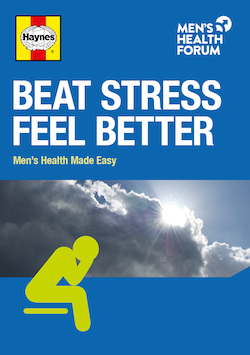Anger time-out

Men are generally more explosive in their anger than women, and often express it in more violent ways - violent language, violence against others or themselves, criminal violence or even suicide.
Occasional anger is normal. The best short-term response if you feel you’re losing control is to remove yourself from the situation. If you get angry often, easily or quickly and it is causing stress for you and others, you need to find a way to stop before it leads to something you will regret. Treatment can include CBT, psychotherapy and anger management courses. See the Depression FAQs for more on treatments for stress, anger, anxiety and depression.
The NHS website offers a free guide to anger self help.
How to take a time-out
When you see your warning signs:
- Remove yourself from the immediate source of stress if you can (you could say ‘I’m going to the bathroom’)
- Give yourself a simple manual or mental task to ‘distract’ your mind
- Change scenery – somewhere peaceful such as a library, church, garden
- Take a walk
- Turn off social media, especially mobile phones and email
- Breathe deeply from the waist rather than the chest to relax the body (try this or search YouTube for ‘diaphragmatic breathing’).
We don't currently post comments online but are always keen to hear your feedback
| This content is wholly based on the Men's Health Forum's man manual Beat Stress, Feel Better which was prepared in line with the NHS England Information Standard of which the MHF is a member. Follow the links to buy copies. |
Date published
31/01/15
Date of last review
18/05/20
Date of next review
18/05/23
References
|
The Men’s Health Forum need your support It’s tough for men to ask for help but if you don’t ask when you need it, things generally only get worse. So we’re asking. In the UK, one man in five dies before the age of 65. If we had health policies and services that better reflected the needs of the whole population, it might not be like that. But it is. Policies and services and indeed men have been like this for a long time and they don’t change overnight just because we want them to. It’s true that the UK’s men don’t have it bad compared to some other groups. We’re not asking you to ‘feel sorry’ for men or put them first. We’re talking here about something more complicated, something that falls outside the traditional charity fund-raising model of ‘doing something for those less fortunate than ourselves’. That model raises money but it seldom changes much. We’re talking about changing the way we look at the world. There is nothing inevitable about premature male death. Services accessible to all, a population better informed. These would benefit everyone - rich and poor, young and old, male and female - and that’s what we’re campaigning for. We’re not asking you to look at images of pity, we’re just asking you to look around at the society you live in, at the men you know and at the families with sons, fathers and grandads missing. Here’s our fund-raising page - please chip in if you can. |



